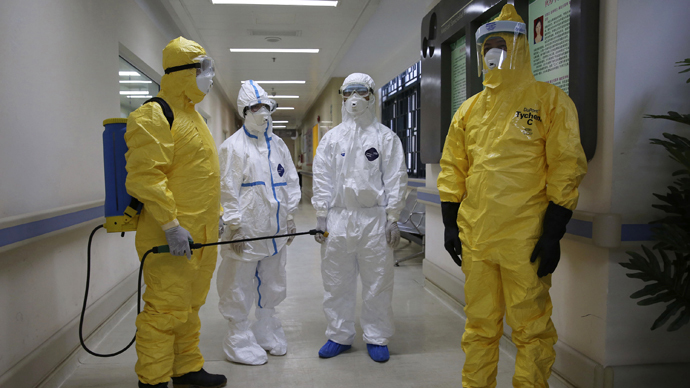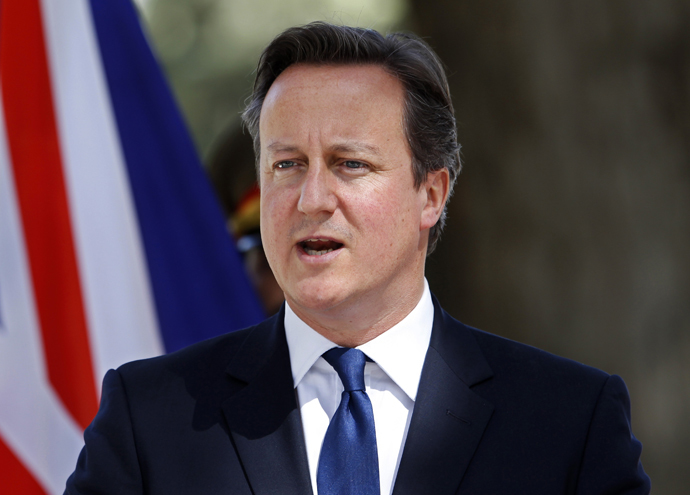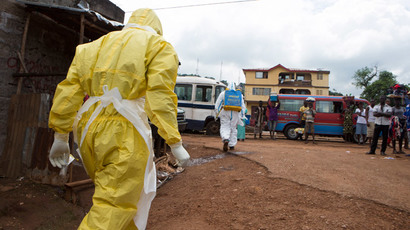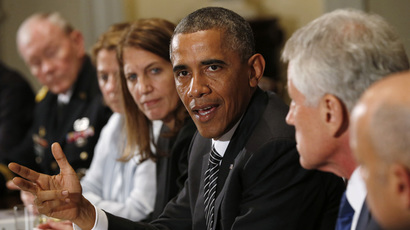British Big Pharma warns Ebola vaccine will come 'too late' to halt spread

One of the world’s biggest pharmaceutical companies says a vaccine to tackle Ebola will “come too late” to curb the current epidemic, as the UK and other European countries begin screening passengers for the virus at international airports.
GlaxoSmithKline (GSK), a British multinational that produces pharmaceuticals, biologics and vaccines, said a working vaccine would not be readily available until late 2015, by which time the epidemic may have spread far beyond West Africa.
The statement follows warnings from the United Nations and World Health Organization (WHO) that there could soon be more than 10,000 new cases of Ebola per week if the spread of the disease is not curbed quickly.
“We either stop Ebola now or we face an entirely unprecedented situation for which we do not have a plan,” said the UN’s Deputy Ebola Coordinator Anthony Banbury on Wednesday.
“The WHO advises within 60 days we must ensure 70 percent of infected people are in a care facility and 70 percent of burials are done without causing further infection,” he added.
Earlier this week, British Prime Minister David Cameron signed off on deploying 750 troops to Sierra Leone to help set up medical treatment centers and to the assist staff on the ground to contain the virus.
He also urged the international community to dedicate more resources to the relief effort in West Africa, after UN Secretary- General Ban Ki-moon criticized leaders for paying a mere $100,000 into a $1 billion UN trust fund to fight the virus.
“This is the biggest health problem facing our world in a generation. It’s very likely to affect a number of the countries that are here today,” Cameron said at the EU-Asia summit in Milan on Thursday.
“Britain in my view has been leading the way. The action we’re taking in Sierra Leone, where we are committing well over £100 million, 750 troops, we are going to be training 800 members of health staff in Sierra Leone, providing 700 beds.”
He also said the international community should “look at their responsibilities and their resources” to ensure the disease did not spread to Europe.

Additionally, the UK’s International Development Secretary Justine Greening said the international community had to “wake up” to the extent of the epidemic and to work with the UK, US and other European countries to provide resources to Ebola-stricken regions.
“It is simply not going to be a tenable approach to simply leave the UK to work with Sierra Leone, to leave the US to work with Liberia, France to work with Guinea and no other countries to get involved,” she told BBC Radio 4.
Ebola has killed around 4,500 people to date, with most fatalities occurring in West Africa, notably in Liberia, Guinea and Sierra Leone.
Big pharmaceutical companies have come under fire for failing to develop a vaccine to combat Ebola prior to the outbreak, with Oxford University Professor Adrian Hill, the scientist leading Britain’s Ebola response strategy, claiming that thousands of lives could have been saved if a vaccine had been developed and stockpiled sooner.
Professor Hill, who is currently developing an Ebola vaccine, hit out at drug companies including GSK, Sanofi, Merck and Pfizer in September, arguing a vaccine wasn’t developed because there was “no business case” for it.
“The problem with that is, even if you've got a way of making a vaccine, unless there's a big market, it's not worth the while of a mega-company,” Hill told the Independent.
“There was no business case to make an Ebola vaccine for the people who needed it most: first because of the nature of the outbreak; second, the number of people likely to be affected was, until now, thought to be very small; and third, the fact that the people affected are in some of the poorest countries in the world and can't afford to pay for a new vaccine. It's a market failure,” he said.
The UN and non-governmental organizations have also warned that a failure to contain the Ebola crisis could result in food shortages that would “devastate” regions in West Africa hardest hit by the epidemic.














